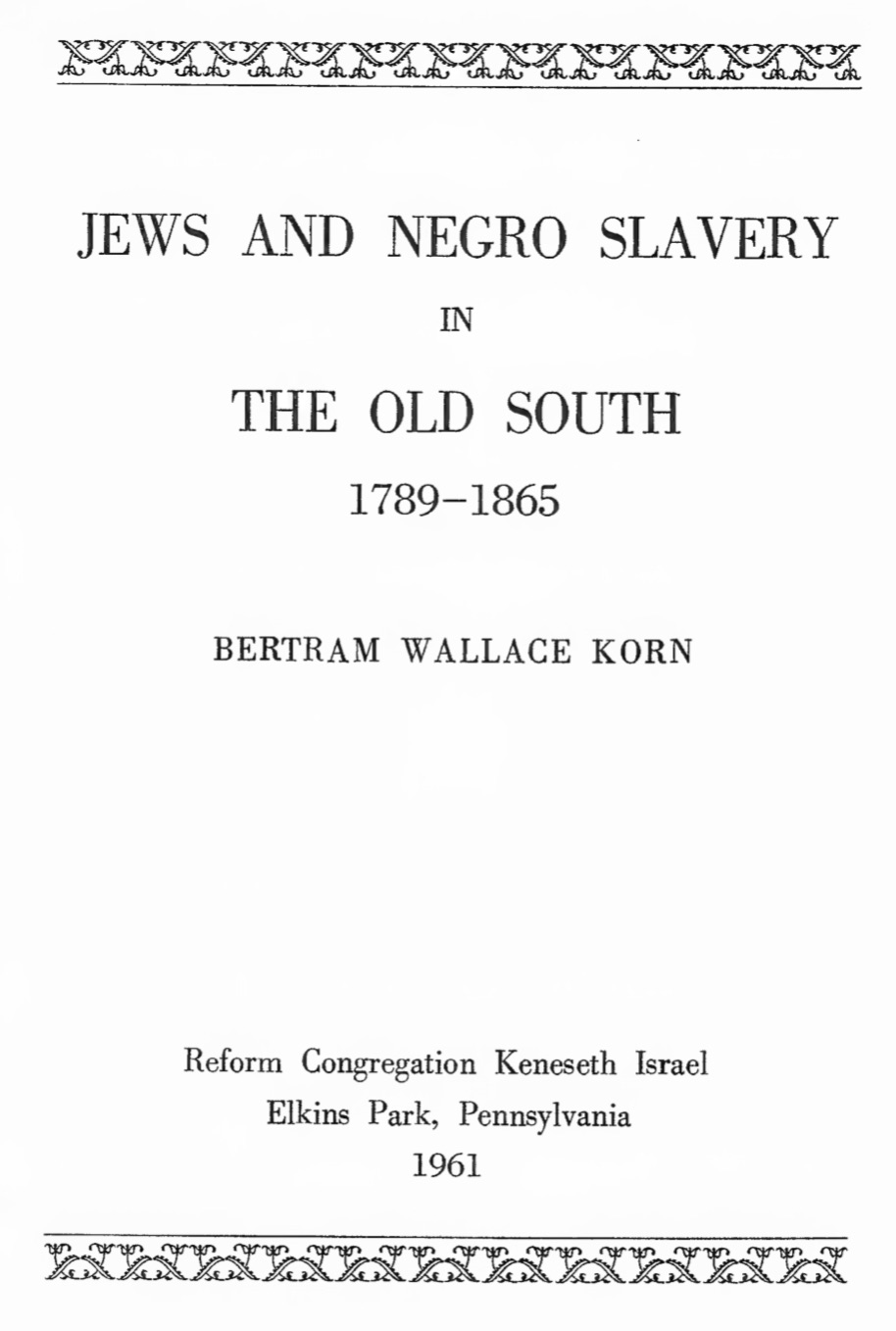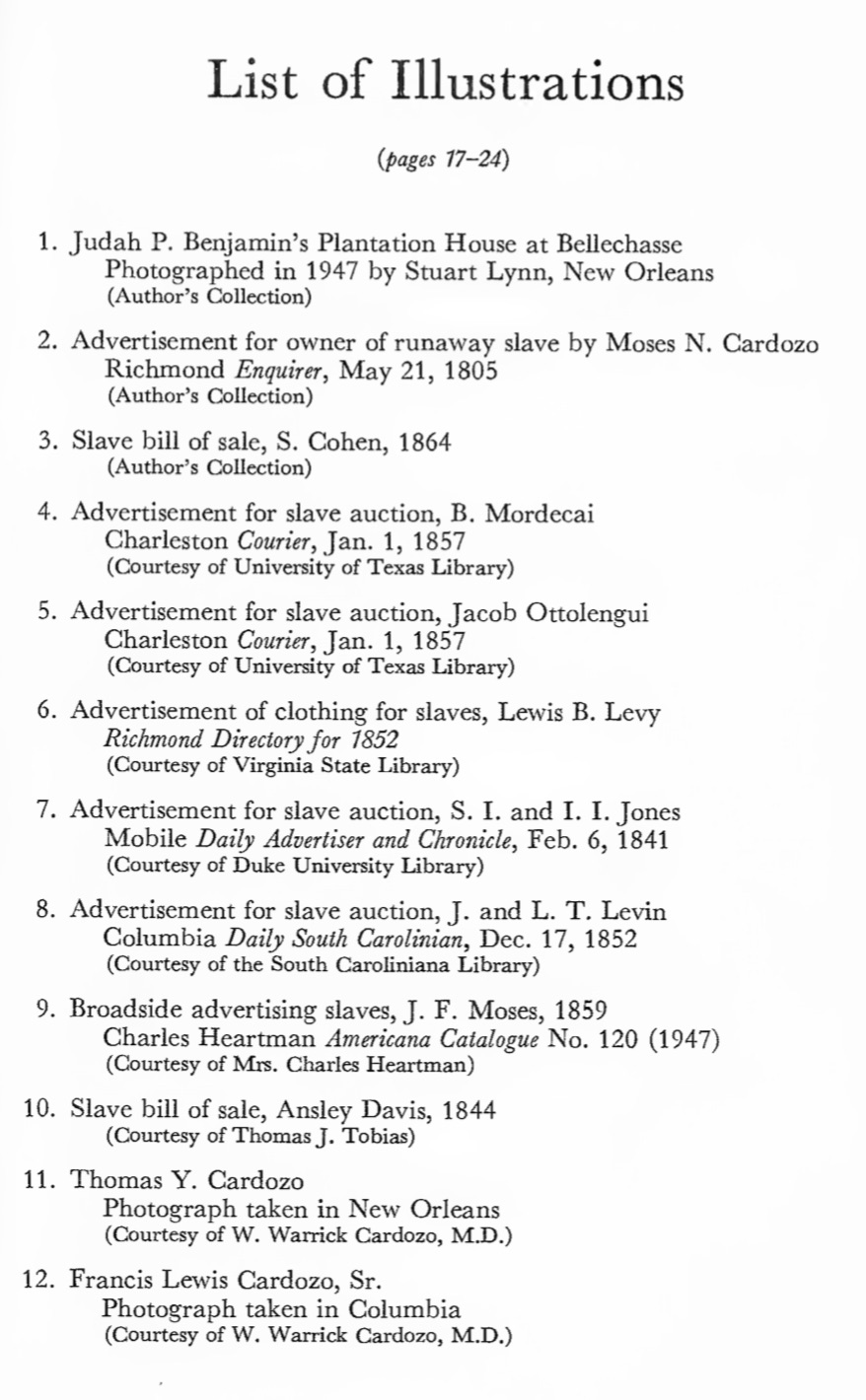Bertram Wallace Korn
Jews and Negro Slavery in The Old South - 1789-1865 (1961)
Some notes and highlights from the book.

Delivered as the Presidential Address at the Fifty-Ninth Annual Meeting of the American Jewish Historical Society, February 18, 1961, and reprinted from the March, 1961, issue of its quarterly Publication, with the assistance of a grant from the Rabbi's Publication Fund of Reform Congregation Keneseth Israel, Elkins Park, Pennsylvania.
Introduction
As we inaugurate this five-year long observance of the Civil War, there is certain to be no diminution of the quantity of historical volumes already flooding forth from the nation's presses. One of the major subjects will undoubtedly continue to be the question of the causes of the Civil War. Some writers will favor political interpretations; others will emphasize economic factors; still others will cite social ingredients. Some will blame the North, and others the South. Some will denounce fool-hardy leadership in the South, or in the North, or both. Others will underline the failure of ordinary citizens in both sections to express their feelings and desires. Many of these writers will be so enamoured of their theories that they will overlook the all-pervasive influence of the crucial problem: slavery. Political, economic, social, psychological, and other currents were present as contributory factors, but they were all related in one way or another to the persistence of the slave system. Had Negro slavery not been an integral aspect of the life of the Old South, there would have been no conflict, no secession, no war. Differences there might have been, but not violence and bloodshed. Slavery was the single indigestible element in the life of the American people which fostered disunion, strife, and carnage, just as the concomitant race problem has continued to an important degree to be a divisive force in American life to this day.
Previous students of the American Jewish scene have appeared to be reluctant to investigate the question of Jewish participation in the slave system. Works on local Jewish history in Southern communities, in particular, have either glossed over or altogether ignored this basic aspect of the life and experiences of the Jews of the Old South. It is my purpose to attempt to survey the following themes: Jews as planters, and as owners of slaves; the treatment of slaves by Jews; the emancipation of slaves by Jews; Jews as harsh taskmasters; business dealings of Jews with slaves and free Negroes; Jews as slave dealers; cases of miscegenation involving Jews and Negroes; and opinions of Jews about the slave system.


✡️🇺🇸 Slave Adverts




"To Sam Rothschild, there was little difference between buying and selling a slave girl and any other kind of merchandise."
"Sometimes Jewish store-keepers would take a flier at an investment in slaves for purely speculative purposes."

"Jacob Barrett later married the daughter of his cousin, another speculator in Negroes, claimed before the Civil War to have around 1000 slaves working his rice plantations near the Savannah River. Among this group were numerous Jewish auctioneers, commission merchants, and brokers."

"... members of Jewish communities who were dealers in slaves were not scorned by their fellow Jews. Both Levin & Israel I Jones occupied particularly prominent positions in the Jewish life of their towns. Levin was the acting rabbi and recognized leader of the Jews of Columbia."

"Slave-dealing obviously did not disqualify Jews from receiving the friendship and esteem of their co-religionists any more than it disqualified Christians; engaging in business transactions in Negro
flesh was not regarded as incompatible with being a good Jew."

"Abraham, like other auc-tioneers of slaves was neither ashamed of nor apologetic about his offerings of Negroes. He even burst into doggerel about his slave merchandise:" https://t.co/69MvgllPXd

"The Monsanto brothers owned plantations at Natchez and dealt in slaves there and in New Orleans, where they also maintained a residence. There is good reason to believe that they were Dutch-born Marranos, and if so, they were probably the first
residents of Jewish birth..."

"Davises, Petersburg, the great slave-traders. . . These men are always in the market, giving the highest price for slaves. During the summer and fall they buy them up at low prices, trim, shave, wash them, fatten them so that they may look sleek, and sell them to great profit." https://t.co/9H7KRSoI8p

"We do not even have the help of religious affiliation in our investigation of this question, since Jewish congregations would not accept Negro members."

"Negro concubines were frequently called "housekeepers," and Simons' bequest to Maria was extraordinarily large. The supposition would be that her employer had a much more personal relationship with Maria than would be mentioned in polite society." https://t.co/WQTlw4zvlo


"Nor was there anyone among the many Jewish journalists, writers, and publicists of the Old South who questioned the moral, political, or economic justice of slavery." https://t.co/39oqUv3L6n

"After the war was over, some Southern Jews still believed that slavery had been a necessary foundation of human society."

"We should not be surprised to discover that there was not a single abolitionist among the Jews of the South, but at least one did stem from this background. He was Marx E. Lazarus..."


